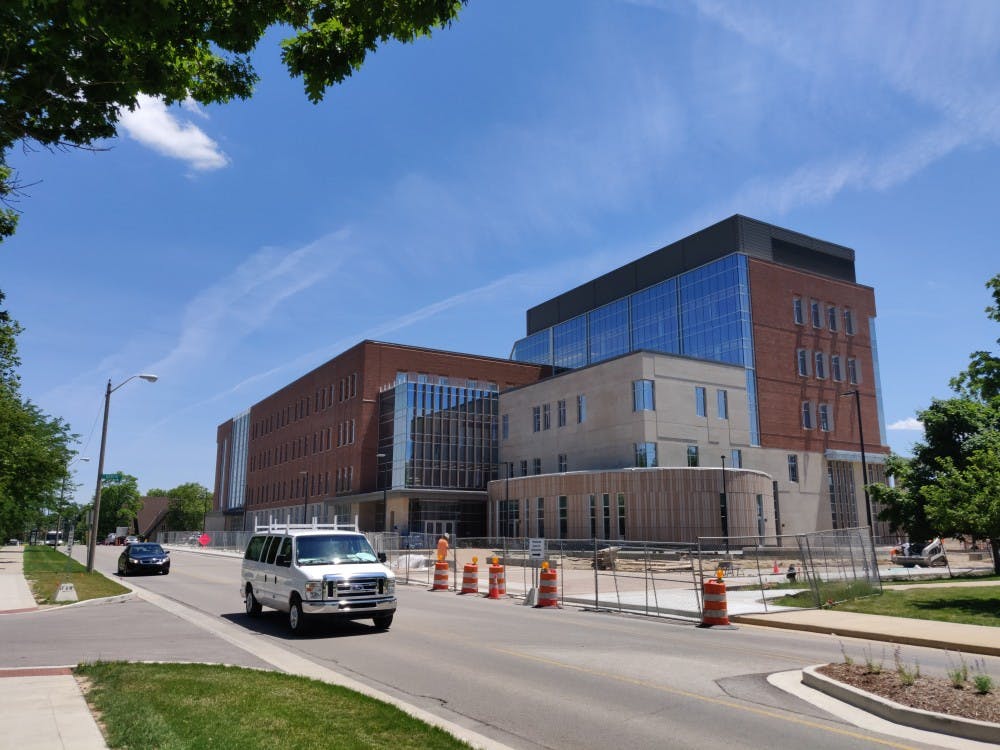With Ball State opening a community vaccination clinic in the Health Professions Building March 19, students and staff have a convenient option for vaccination once they become eligible. Here's information about COVID-19 vaccines, from the manufacturing process to common side effects.
Differences between COVID-19 vaccines
The United States Food and Drug Administration (FDA) has approved three coronavirus vaccines for emergency use.
Pfizer
The Pfizer-BioNTech vaccines can be stored between minus 112 and minus 76 degrees Fahrenheit up to their expiration date or refrigerated between 36 and 46 degrees Fahrenheit for up to five days.
The Pfizer vaccine is only authorized for people over the age of 16. It requires two doses spaced at least 21 days apart.
Pfizer reported a 95-percent efficacy rate in preventing illness from COVID-19 after clinical trials.
Pfizer uses Messenger RNA (mRNA) in its vaccine, which gives instructions to cells on how to produce a harmless version of the spike protein and develop antibodies against the protein and coronavirus. Once immune cells receive mRNA instructions, they produce the spike protein and follow instructions to get rid of them. Cells remember the instructions if a vaccinated person is introduced to COVID-19 later.
Moderna
The Moderna vaccines can be stored between 36 and 46 degrees Fahrenheit for up to 30 days before vials are opened.
The Moderna vaccine is only authorized for people over the age of 18. It requires two doses spaced at least 28 days apart.
Moderna reported a 94.5-percent efficacy rate in preventing illness from COVID-19 after clinical trials. Moderna uses the same mRNA manufacturing techniques as Pfizer in its vaccines.
Johnson & Johnson
The Johnson & Johnson vaccines can be stored between 36 and 46 degrees Fahrenheit up to their expiration date or between 47 and 77 degrees Fahrenheit for up to 12 hours before vials are punctured.
The Johnson & Johnson vaccine is only approved for people over the age of 18. It requires one dose.
Johnson & Johnson reported a 74.4-percent efficacy rate in preventing moderate-to-severe illness from COVID-19 in United States clinical trials. The Johnson & Johnson vaccine is made with a viral vector technique, meaning the shots deliver a harmless virus to the body so cells can produce antibodies against the spike protein to develop immunity against COVID-19.
Source: Centers for Disease Control and Prevention
Common side effects of COVID-19 vaccines
On the arm that got the shot:
- Pain
- Redness
- Swelling
Throughout the rest of the body:
Tiredness
Headache
Muscle pain
Chills
Fever
Nausea
Any side effects usually fade in a few days.
Source: Centers for Disease Control and Prevention
How to schedule a COVID-19 vaccination appointment
Once you’re eligible for a free COVID-19 vaccine in Indiana, schedule an appointment by visiting OurShot.in.gov or calling 211 between 8 a.m. and 8 p.m.
Hoosiers with specific conditions that put them at a higher risk of severe illness from contracting COVID-19 are eligible to be vaccinated once their healthcare provider submits their information to the Indiana Department of Health.
Vaccines are also available at Walmart, Meijer and Kroger. Walmart uses the state’s registration system, but Meijer and Kroger each have their own systems. Meijer will ask questions about vaccine eligibility and require a zip code to find nearby pharmacies that offer vaccinations. Kroger will ask for a zip code to find nearby pharmacies and will specify which stores offer COVID-19 vaccines.
Source: Indiana State Department of Health
What can I do after I’ve been vaccinated?
COVID-19 vaccination is an important step in recovering from the pandemic and returning to some usual activities.
It typically takes two weeks for cells to build immunity against COVID-19 after being fully vaccinated. That means it is possible a person could still get COVID-19 before or just after vaccination and then get sick because the vaccine did not have enough time to provide protection. Scientists are still studying how long protection from COVID-19 vaccines lasts.
Though COVID-19 vaccines prevent recipients from getting sick, scientists are still studying how well vaccines prevent people from carrying and spreading the virus without symptoms. This means it’s important for vaccinated people to continue to wear a mask, socially distance and take precautionary measures against COVID-19.
Once people are fully vaccinated and have waited approximately two weeks for cells to build immunity to COVID-19, they should be able to safely gather indoors with other fully-vaccinated people without wearing a mask. As scientists learn more, the Centers for Disease Control and Prevention will continue to update its guidance for vaccinated and unvaccinated people.





